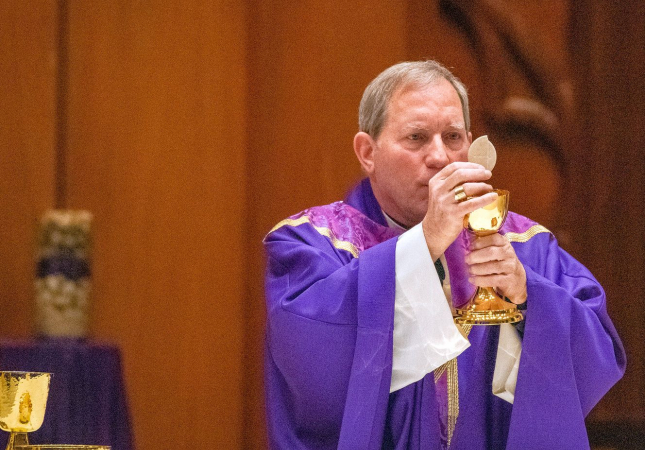
Today we begin this season of Grace……and are offered an invitation to enter into a very powerful period in the Church year.
The Lord’s invitation has been extended, “return to me and rend your hearts.” In other words, let us tear open our hearts to the Lord.
As the Holy Father writes in his Lenten message: Lent is a favorable time for personal and community renewal, as it leads us to the paschal mystery of the death and resurrection of Jesus Christ.
Jesus, in this Gospel, presents to us the activity of the Lenten season…but it is quite different than the external actions of the hypocrites. We don’t want to fall into this category. The word hypocrite comes from the Greek word for “actor”. Actors pretend to be someone they're not. We fall into hypocrisy when appearances are cultivated but the heart remains unconverted. We reduce the act of receiving ashes to an empty rite if we don’t embrace their meaning – we have been redeemed by the death and resurrection of Jesus.
Our Lenten activity must be rooted in an attitude of the heart"
Our Lenten activity must be rooted in an attitude of the heart….our interior life…the inner place of our relationship with Christ. In other words, we open our heart and connect our desire for holiness with His Christ’s desire for us. We connect the many, many desires we have with His deepest desire – his desire for you and me.
This is where true conversion takes place, in this heart to heart encounter; his desire for us meeting our desires – most especially our desire for him.
Prayer, fasting and almsgiving
How does this happen? In the activity Jesus presents in the Gospel – prayer, fasting and almsgiving.
Prayer purifies our hearts, our intentions, our desires and brings us into a deeper encounter and intimacy with the Lord.
Fasting detaches us from our comfort and from ourselves. Fasting must be connected with an intense prayer life to be effective, producing fruit that leads to holiness. These two Lenten practices help us to turn away from sin – those things which weaken our relationship with Christ. Perhaps, instead of deciding what to give up, we should decide what in our lives need to be re-directed. Putting the kibosh on our selfish-love, and re-directing it toward the love of God and love of others.
Our truest identity
Through these Lenten practices, God wants to convert our lives and transform our sinful attitudes so that the beauty of his creation (our truest identity) may shine through.
But is also goes beyond this. The third activity of Lent is almsgiving. It reflects our communion with the poor members of the Body of Christ and reminds us that our true wealth is not in things, but the love of God. It too, like fasting, must be connected to prayer otherwise our almsgiving will be merely giving money away. The sign of the conversion of our hearts is outwardly expressed in our charity and generosity toward others.
This Lenten season is about letting God have his way with us, so that we can discover and see who we really are; and we’ll discover the love of God in ways that we have never experienced before.
But Lent should be more than a just a time for fasting. It should also be a joyous season of feasting. Fasting from certain things in order to feast on other things. It is a season in which we should:
Fast from judging others; feast on the Christ within them.
Fast from emphasis on differences; feast on the unity of life.
Fast from thoughts of illness; feast on the healing power of God.
Fast from words that pollute; feast on phrases that purify.
Fast from discontent; feast on gratitude.
Fast from anger; feast on patience.
Fast from pessimism; feast on optimism.
Fast from complaining; feast on appreciation.
Fast from negatives; feast on affirmatives.
Fast from unrelenting pressures; feast on unceasing prayer.
Fast from hostility; feast on non-resistance.
Fast from bitterness; feast on forgiveness.
Fast from self-concern; feast on compassion for others.
Fast from personal anxiety; feast on eternal truth.
Fast from discouragement; feast on hope.
Fast from lethargy; feast on enthusiasm.
Fast from suspicion; feast on truth.
Fast from thoughts that weaken; feast on promises that inspire.
Fast from shadows of sorrow; feast on the sunlight of sincerity.
Fast from idle gossip; feast on purposeful silence.
Fast from problems that overwhelm; feast on prayer that undergirds.
Fast from instant gratifications; feast on self-denial.
Fast from worry; feast on total trust in God.
And finally, fast from sin; feast on the abundance of God’s mercy.
The joy in doing this type of fasting and feasting is that they truly lead to rending our hearts and to conversion. And conversion is turning from those things that do not give life, and a turning to God, who gives life to us in abundance.
As you receive ashes today, may they be a sign of your commitment to reflect upon your baptism, your life in Christ; may they be a sign of your commitment to the acts of penance and charity that you will undertake; and may they be a sign of your joyful conversion from death to life in abundance.